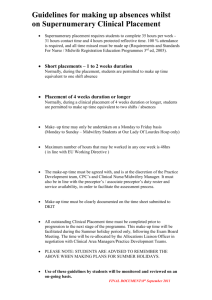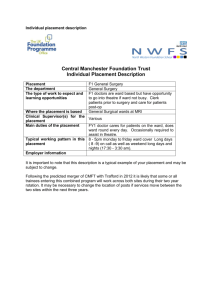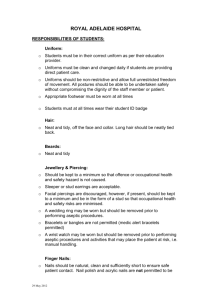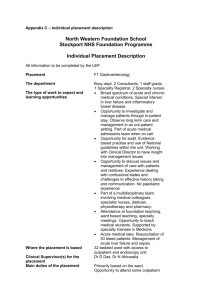CUMH Fetal Assessment Unit Orientation
advertisement
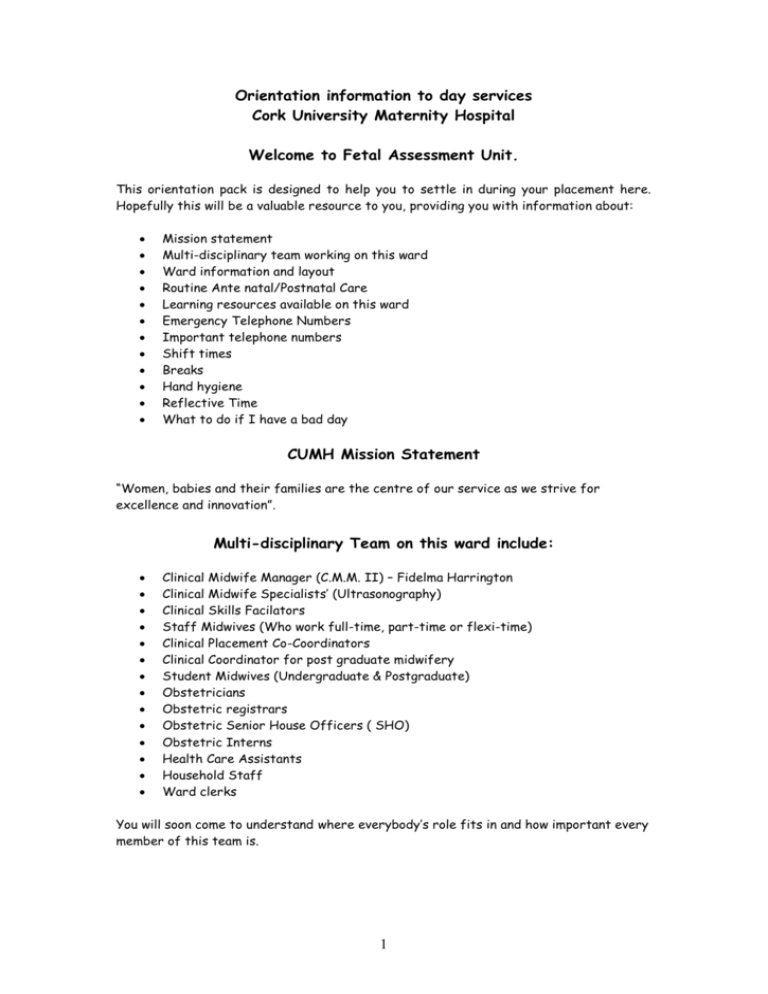
Orientation information to day services Cork University Maternity Hospital Welcome to Fetal Assessment Unit. This orientation pack is designed to help you to settle in during your placement here. Hopefully this will be a valuable resource to you, providing you with information about: Mission statement Multi-disciplinary team working on this ward Ward information and layout Routine Ante natal/Postnatal Care Learning resources available on this ward Emergency Telephone Numbers Important telephone numbers Shift times Breaks Hand hygiene Reflective Time What to do if I have a bad day CUMH Mission Statement “Women, babies and their families are the centre of our service as we strive for excellence and innovation”. Multi-disciplinary Team on this ward include: Clinical Midwife Manager (C.M.M. II) – Fidelma Harrington Clinical Midwife Specialists’ (Ultrasonography) Clinical Skills Facilators Staff Midwives (Who work full-time, part-time or flexi-time) Clinical Placement Co-Coordinators Clinical Coordinator for post graduate midwifery Student Midwives (Undergraduate & Postgraduate) Obstetricians Obstetric registrars Obstetric Senior House Officers ( SHO) Obstetric Interns Health Care Assistants Household Staff Ward clerks You will soon come to understand where everybody’s role fits in and how important every member of this team is. 1 Ultrasound Scan. Ultrasound in pregnancy is a diagnostic tool that is used to investigate the environment of the womb by using high frequency sound waves. All women in CUMH are offered ultrasound scans throughout their pregnancy. The scan shows doctors/midwives and parents how many babies are expected, how advanced the pregnancy is (the estimated date of delivery) and the position of the baby and the placenta. Biophysical assessment of fetal growth, fetal breathing, movements and liquor volume may also be assessed or Doppler studies to check for fetal well being. Anomaly scans and amniocentesis are also performed. Fetal Assessment Unit (FAU). The Fetal Assessment Unit is a day care unit that provides care for pregnant women with complicated high risk pregnancies that require close surveillance , such as; IUGR, SGA, Pre-eclampsia, threatened preterm labour etc. A designate midwife & doctor provide monitoring (CTGs’) and ultrasound scans for such cases. Women with hyperemesis in need of intravenous fluids may also attend this unit. Women may also be seen if FAU if they require blood pressure assessment or profiling. The midwife will carry out an abdominal examination, take blood pressure, urine and blood tests, and may carry out fetal monitoring, and/or a scan if required. Aislinn Suite This is an early pregnancy clinic for women with pregnancy related pain or bleeding up to 12 weeks gestation. Women with a past history of pregnancy loss, recurrent miscarriage or previous ectopic or molar pregnancy may also be seen here in the first trimester. This clinic is located on the Southside of Floor 2 CUMH at the beginning of 2 south Antenatal ward. The clinic is open 8-1 Mon to Fri it is an appointment only clinic. Women can self refer or referrals may be made via ER/GP/Doctor. As a student Midiwfe you will attend placement in Aislinn suite as part of FAU or community placement. All staff and students are obliged to read and understand the “Ward safety statement” located at the Midwives Station. All ward policies/Protocols are also available at the Midwives Station. o o o o o o o o o o o Learning resources available on this ward include: Clinical Placement Guidelines for BSc. in Midwifery students. Skills for Midwifery Practice 3rd Ed (Johnson & Taylor, 2010) Midwifery Practice Education Folders- on ward PC Midwifery Text Books NMBI Guidelines Patient Education Booklets and Leaflets Patients Charter British National Formulary (B.N.F) Green folder specific to Public Health Nursing students (while these students are on placement) Q Pulse Document Management System Email and Internet Access ( must be signed off by Director of Midwifery) 2 Emergency Numbers It is essential that you know the following emergency numbers Fire Dial__22222___________ Cardiac Arrest Dial_ 22555____________ Obstetric Emergencies: 20799 By the end of the first day in each area, it is essential that you are capable of locating the following emergency equipment: Resuscitation Trolley Located_________________ eRtatissuseR Located_________________ Suction Machine Located_________________ Fire Hose Located_________________ Fire Extinguisher Located________________ Fire Panel Located________________ Fire Blanket Located_________________ Important Telephone Numbers Cork University Maternity Hospital Ward 2 East Ward 2 South Ward 3 East Ward 3 South 021- 4920500 Ext: 20633 Ext: 20628 Ext: 20663 Ext: 20650 3 Ward 4 South Delivery Suite Neo Natal Unit High Dependency Unit Admissions/ Emergency Room Day Services Ext: 20688 Ext: 20547/ 20548/ 20544 Ext: 20514/ 20515/ 20516 Ext: 20553 Ext: 20595/ 20596/ 20545 Ext: 20563/ 20562 Shift Times FAU department operates from Monday to Friday. This is a day services area. The offduty rota will be available in the Midwives station for all staff. Supernumerary students year 1-3 have placement over 4 days Mon- Wed 08.00-16.00, Thurs 8-14.00 (All bank holiday Mondays are off on this area and 24 hours is completed Tues- Thurs). Staff and post graduate student midwives work 08:00-17.00 and 08:00-13:00 on Fridays. Higher Diploma (Post grad) students will be allocated here as part of the community placement. Break Times All shifts include a ‘break’, and it is important that you take your breaks. Breaks in FAU are 20 minutes for morning break and half an hour for lunch. Don’t be afraid to ask a member of staff or CMM about break times and to show you where you can avail of canteen facilities. The main canteen is situated in the CUH campus which is accessible via a link corridor located near the main staff changing facility on 1st Floor. Alternatively you can use the main entrance at CUH and ask for directions at the reception desk. The staff dining area is located on 4 East. This is accessible using your ID swipe card. This room has a staff fridge, microwave, toaster, kettle, vending machines, coffee machine, TV, Dining and Lounge area. Alternatively you can use the “Coffee Station” Café located on 1st floor CUMH. Hand Hygiene It is important that you are aware of the importance of Hand Hygiene & utilise same. You have completed education on Hand Hygiene and WHO “5 moments of Hand Hygiene”. It is also essential that you familiar with and use ‘standard precautions’ in practice for the safety of the women and babies in your care and for your own safety. Where to find things It can be very stressful when you are told to get something and you don’t know where it is. So don’t be afraid to ask another midwife or your preceptor where it is. Remember if you move something please ensure to put it back where you found it. 4 Absenteeism 2nd and 3rd year B.Sc. Student Midwives Although you are not employees of the HSE, when you are absent from a clinical placement it is important that the HSP is aware of the absence. Sick leave must be reported to the ward Manager or her deputy and the Senior Midwifery Manager on duty prior to the beginning of the shift. Please adhere to UCC and hospital guidelines for BSc Midwifery with regard to sick leave. Also contact your CPC to make them aware of your absence. Post Graduate Student Midwives As you are employees of the HSE the policy regarding notification of the HSP when absent from work applies to you. Absenteeism must be reported to the ward Manager or her deputy and the Senior Midwifery Manager on duty prior to the beginning of the shift. The clinical Co-ordinator must also be contacted. Please make every effort to give notice of absenteeism as changes are required to provide adequate cover in the clinical area. The night superintendents will deal with this between 20.00-08.00hrs. It is not acceptable to get a family member or friend to contact the hospital. Please refer to hospital orientation booklet for further information re hospital Absenteeism policy. Preceptors/ Associate preceptors for students Each student midwife will be allocated a midwife preceptor during their clinical placement. Your preceptor will have completed a teaching and assessing course/ preceptorship course that enables them to support, guide and assess and supervise students in the clinical practice setting and assist students learn the practice of midwifery. Where possible you will work alongside your preceptor and so it is important that you feel you can approach the person at any time to discuss your learning needs while you are on this placement. Therefore off duty request s can only be accommodated at a at need basis. Your preceptors name will be next to student name on the off duty. Please identify yourself to your preceptor on the first day of clinical placement. While you are in OPD, you will also work with other midwives, which will provide you with valuable knowledge and experience. Clinical Learning Outcomes Handbook It is important that prior to a placement, students should study their Clinical Learning Outcomes handbook to identify the elements and skills they would like to achieve exposure/participation/identification or internalisation in. You can then discuss these with your preceptor and CPC at the commencement of placement interview. Student Midwives in accordance with NMBI, must also record experiences in a Clinical Practice Experience Booklet. FAU will provide you with ample opportunity to record antenatal examinations and care of the “at risk “woman. Student tip don’t wait until the end of your placement to get your clinical learning outcomes handbook signed off. Do it as you go along. Be persistent, and ensure you have your booklet with you every day. 5 Reflective time REFLECTION! Reflective practice is an essential facet of learning from practice for both students and midwifery staff. It enables us to utilise what we see and do during clinical practice in a way which links theory and practice. This encourages us to examine and explore behaviours, thoughts, feelings and attitudes about clinical experiences. Undergraduate students are allocated 5 hours of reflective practice per week of reflective time, in addition to practice placement hours. All students should aim to complete reflective accounts during practice placement, on competencies which are achieved in midwifery practice, using the stages of Gibbs Cycle as a framework. This enables learning to occur not just from a theoretical perspective, but also from that of experiential learning. The student should aim to complete one reflective account per week. What to do if you have a bad day! Please don’t be afraid to approach your preceptor or another member of staff if you are feeling upset or unhappy during your time in ER. There are many reasons that might trigger these feelings, but remember it is most important that you tell somebody. Please don’t hesitate to contact your CPC. Clinical placement coordinators Ger Hayes & Breda Hayes- 021 -4920732 Fiona Kirby (Post grad) - 021- 4920735 For common Abbreviations you may encounter on this ward please refer to hospital policy and midwifery education folder for comprehensive listing. Midwifery Practice Development 2007-edited and updated 2014 6
